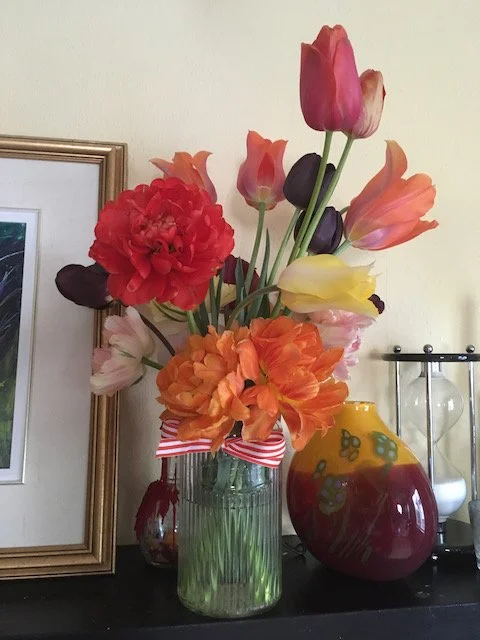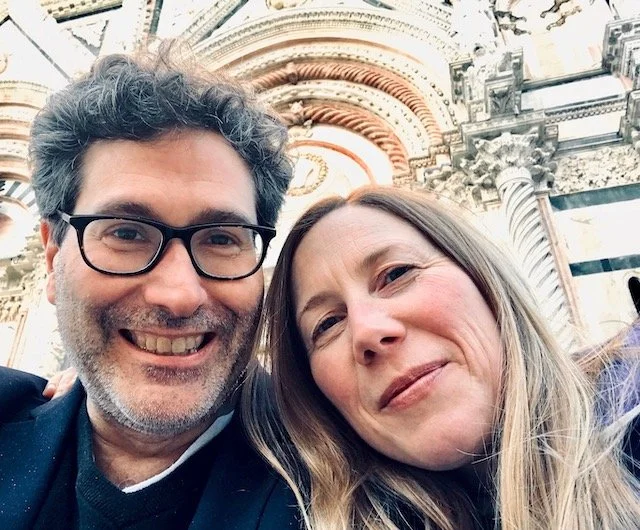An Anniversary
Like many Americans, I find myself thinking about anniversaries these days. Wednesday, March 11, 2020 was Matt’s last choir rehearsal, the last time he would stand in front of a room full of people singing. March 12 was my last day of regular, carefree teaching; Friday, March 13, my last performance class with my high school students. Schools in New Mexico were shut down that day; the church closed its doors. The last time we had friends over for dinner was Monday, March 16. Time flies. Or stands still, depending.
There is another anniversary tapping Matt and I on the shoulder this month: March 18 marks the 29th anniversary of the first time we kissed. We were supposedly only friends, but Matt decided he wanted to give me something “to think about.” I’ve been thinking about that kiss for 29 years now.
We met at Trinity University in San Antonio, the first week of my freshman year. A piano professor introduced us in the hallway of the music building. “Hey!” she said, “you are both from Missouri.” Matt was from Kansas City, the Kansas side technically. I was drowning in new faces, my head spinning with names and hometowns. Matt remembers this casual introduction clearly. I don’t.
Matt was four years older and majoring in music education. He had a job in the music office, worked as a stagehand in the concert hall, was the president of the music fraternity. Matt was, in the most elemental sense of the word, a music enthusiast. While so many musicians get stuck in their own genre, myopically self-absorbed, and know little repertoire outside their particular instruments, Matt was different. He listened to all kinds of music: operas, jazz, string quartets, symphonies, violin sonatas. His passion was contagious, winning him the respect of students and faculty alike. He was friends with the music librarian, who put aside rare records and recordings for him. He regularly had drinks with instrumental professors so he could ask questions about the craft of performing and the particular challenges of playing in chamber ensembles. He befriended the secretary in the music office, who shared his love for Ella Fitzgerald. He would collect random groups of people to attend concerts together; he formed an opera club and frequently held music parties in his dorm room.
On weekends, Matt answered phones at a mail-order classical record company based in San Antonio. After some months of working there, he managed to convince the men stocking CDs in the warehouse, who otherwise blasted Tejano music by the hour, to listen instead to the Saturday afternoon broadcast of the Metropolitan Opera. One week, a new guy came to work in the warehouse. As was his custom, just before one o’clock, Matt changed the radio station to the classical channel in time to catch the opening announcement, “Live from The Met!” The new guy started to protest, getting up to turn the dial, before being stopped by another warehouse employee. “No, dude,” he was told. “On Saturdays, we listen to the opera.”
In spite of his persuasive zeal for the music he loved, Matt would do anything not to practice. “I became a choir director mainly so I could practice in a room full of other people,” he has often said. Instead of practicing, Matt spent much of his time at Trinity perfecting the art of shooting his keyring on the waxed linoleum floor of the practice wing, down the stairs, across the lobby and successfully hitting the glass wall at the other end with a loud, satisfying clink.
Introverted and quiet, I preferred the solitude of the practice rooms to the actual human interaction required in the hallways. While Matt practiced the stunt with his keys, I practiced the piano.
Some nights he’d come looking for me in the practice rooms interrupting my work. “Hey Dollface,” he’d say. “Time to take a break.” Matt was always reading, voraciously, promiscuously: political biographies, books about composers, long profiles from The New Yorker, memoirs. He loved reading out loud, I liked being read to. Sitting on the floor of my tiny windowless practice room with his back against the door and his legs stretched out under the piano bench, Matt would read aloud until the security guard locking up the building kicked us out into the night.
From the beginning of our relationship, we were the yin and the yang: his playful curiosity balancing my dedicated, but often rigid, practice. While I cloistered myself in a practice room, he spent hours in the university library listening to recordings of my pieces or researching their origins. “Amy!” he’d tell me later, “did you know that . . .” and off he’d go, filling in yet another gap in my musical background, as excited as if he had just presented me with a bouquet of roses.
In a way, that’s just what he did; over and over again he brought me flowers. He bought scores that he wanted to hear me play; he never seemed to grow tired of listening to me practice. In history and theory classes I was learning to sort out the musical periods and composers I had been playing my whole life; in long conversations with Matt, I began to articulate what this tradition of musical history and heritage might mean to my work at the piano. I found myself for the first time not just playing music, but learning to think about music, finding the intersection between the subject Matt understood so thoroughly and the rituals I knew so well. Shamelessly, he hitched a ride on my habits and discipline; in similar fashion, I piggybacked on his passion and scholarship, realizing that he could give refinement and depth to my practice.
One cold January before we were married, we went to New York City and slept on the living room floor of friends living on the Upper West Side. We went to see a college friend perform in the long-running Greenwich Village production of The Fantasticks. We went to the Metropolitan Museum. We went to the Met and heard Strauss’ Elektra. We made our way out to Brooklyn to hear chamber music on a barge overlooking the Manhattan skyline. We saw Angels in America on Broadway.
Late one afternoon we found ourselves wandering through Central Park. The city had had a recent blizzard and although we had spent the week tramping through the dirty, grey snowdrifts piled up along the gutters and sidewalks, Central Park was still white, still beautiful. The lights were beginning to go on in the apartments overlooking the park and as we meandered around the outskirts we shamelessly tried to peer into other people’s lives. In one apartment there was a dining room table set for twelve; in another, a library with red walls and a leather armchair crouched next to the fireplace where an older man sat reading. Someday, we vowed to one another, we’d live in New York City. We would have rooms lined with books and plants crowding every windowsill. “You can have your grand piano in the living room,” Matt promised. I didn’t have a grand piano. We were young and poor. This trip cost us every penny we didn’t have. It would have to serve as every Christmas, birthday and anniversary present for years to come. But none of that mattered. We madly in love: with each other, with New York, with all the potential that stretched before us. We would live forever. Back then anything was possible.
Anniversaries. Almost to the day the pandemic turned our world upside down, I got my first vaccine dose. I will receive the second on April Fool’s Day; the joke, of course, being on all of us. The last 12 months have sent us personally and collectively reeling, but if someone would have told me last March that I was going to have dinner with Matt every night for a year, I would have thought it the best gift ever.
I still do.

